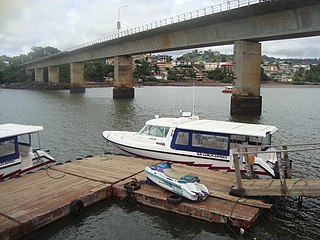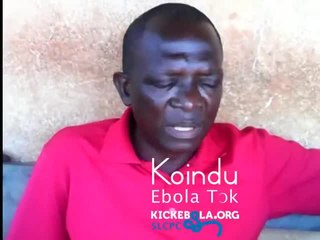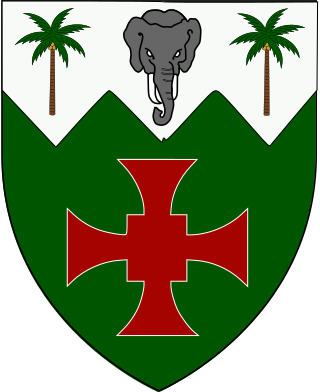Related Research Articles

Sierra Leone, officially the Republic of Sierra Leone, is a country on the southwest coast of West Africa. It is bordered by Liberia to the southeast and Guinea surrounds the northern half of the nation. Covering a total area of 71,740 km2 (27,699 sq mi), Sierra Leone has a tropical climate, with diverse environments ranging from savanna to rainforests. The country has a population of 7,092,113 as of the 2015 census. Freetown is the capital and largest city. The country is divided into five administrative regions, which are subdivided into 16 districts.
Sierra Leone first became inhabited by indigenous African peoples at least 2,500 years ago. The Limba were the first tribe known to inhabit Sierra Leone. The dense tropical rainforest partially isolated the region from other West African cultures, and it became a refuge for peoples escaping violence and jihads. Sierra Leone was named by Portuguese explorer Pedro de Sintra, who mapped the region in 1462. The Freetown estuary provided a good natural harbour for ships to shelter and replenish drinking water, and gained more international attention as coastal and trans-Atlantic trade supplanted trans-Saharan trade.

Freetown is the capital and largest city of Sierra Leone. It is a major port city on the Atlantic Ocean and is located in the Western Area of the country. Freetown is Sierra Leone's major urban, economic, financial, cultural, educational and political centre, as it is the seat of the Government of Sierra Leone. The population of Freetown was 1,055,964 at the 2015 census.

Sierra Leonean Creole or Krio is an English-based creole language that is lingua franca and de facto national language spoken throughout the West African nation of Sierra Leone. Krio is spoken by 96 percent of the country's population, and it unites the different ethnic groups in the country, especially in their trade and social interaction with each other. Krio is the primary language of communication among Sierra Leoneans at home and abroad, and has also heavily influenced Sierra Leonean English. The language is native to the Sierra Leone Creole people, or Krios, a community of about 104,311 descendants of freed slaves from the West Indies, Canada, United States and the British Empire, and is spoken as a second language by millions of other Sierra Leoneans belonging to the country's indigenous tribes. English is Sierra Leone's official language, and Krio, despite its common use throughout the country, has no official status.
The Sierra Leone Civil War (1991–2002), or the Sierra Leonean Civil War, was a civil war in Sierra Leone that began on 23 March 1991 when the Revolutionary United Front (RUF), with support from the special forces of Liberian dictator Charles Taylor's National Patriotic Front of Liberia (NPFL), intervened in Sierra Leone in an attempt to overthrow the Joseph Momoh government. The resulting civil war lasted 11 years, enveloped the country, and left over 50,000 dead.

Fourah Bay College is a public university in the neighbourhood of Mount Aureol in Freetown, Sierra Leone. Founded on 18 February 1827, it is the first western-style university built in Sub-Saharan Africa and, furthermore, the first university-level institution in Africa. It is a constituent college of the University of Sierra Leone (USL) and was formerly affiliated with Durham University (1876–1967).
The Sherbro people are a native people of Sierra Leone, who speak the Sherbro language; they make up 1.9% of Sierra Leone's population or 134,606. The Sherbro are found primarily in their homeland in Bonthe District, where they make up 40% of the population, in coastal areas of Moyamba District, and in the Western Area of Sierra Leone, particularly in Freetown. During pre-colonial days, the Sherbro were one of the most dominant ethnic group in Sierra Leone, but in the early 21st century, the Sherbro comprise a small minority in the nation. The Sherbro speak their own language, called Sherbro language.

Mass media in Sierra Leone began when the first modern printing press in Africa arrived at the start of the 19th century. In the 1860s the country became a journalist hub for Africa with professional travelling to the country from across the continent. At the end of the 19th century the industry went into decline and when radio was introduced in the 1930s this became the primary communication media. Print media is not widely read in Sierra Leone, especially outside Freetown, partially due to the low levels of literacy in the country. In 2008 there were 15 daily newspapers in addition to those published weekly. Among newspaper readership young people are likely to read newspapers weekly and older people daily. The majority of newspapers are privately run and are often critical of the government.

The Sierra Leone Grammar School was founded on 25 March 1845 in Freetown, Sierra Leone, by the Church Mission Society (CMS), and at first was called the CMS Grammar School. It was the first secondary educational institution for West Africans with a European curriculum. Many of the administrators and professionals of British West Africa were educated at the school.
The Sierra Leone women's national football team is governed by the Sierra Leone Football Association.

Sierra Leone is officially a secular state, although Islam and Christianity are the two main and dominant religions in the country. The constitution of Sierra Leone provides for freedom of religion and the Sierra Leone Government generally protects it. The Sierra Leone Government is constitutionally forbidden from establishing a state religion, though Muslim and Christian prayers are usually held in the country at the beginning of major political occasions, including presidential inauguration.

Constance Cummings-John was a Sierra Leonean educationist and politician. She was the first woman in Africa to join a municipal council and in 1966 became the first woman to serve as mayor of Freetown. She was based in London, England, for the latter part of her life.
Hannah Benka-Coker,, néeLuke was an educator from Sierra Leone. She is one of the founders of the Freetown Secondary School for Girls (FSSG) which was established in 1926.

Sierra Leone, officially the Republic of Sierra Leone, is a Constitutional Republic in West Africa. Since it was founded in 1792, the women in Sierra Leone have been a major influence in the political and economic development of the nation.
The following is a timeline of the history of the city of Freetown, Sierra Leone.

Sierra Leone is home to about sixteen ethnic groups, each with its own language. In Sierra Leone, membership of an ethnic group often overlaps with a shared religious identity.

The Sierra Leone Creole people are an ethnic group of Sierra Leone. The Sierra Leone Creole people are descendants of freed African-American, Afro-Caribbean, and Liberated African slaves who settled in the Western Area of Sierra Leone between 1787 and about 1885. The colony was established by the British, supported by abolitionists, under the Sierra Leone Company as a place for freedmen. The settlers called their new settlement Freetown. Today, the Sierra Leone Creoles are 1.2 percent of the population of Sierra Leone.

Yvonne Denise Aki-Sawyerr, OBE is a Sierra Leonean politician and finance professional, who is serving as the current mayor of Freetown, Sierra Leone's capital and largest city; she assumed office on 11 May 2018. Prior to becoming head of the Freetown City Council, Aki-Sawyer had worked extensively in the UK financial and professional services industry. She had also taken either pioneering or crucial roles in various charity and public service projects in the UK and Sierra Leone, including participation in the fight against Ebola in 2014 and the subsequent recovery initiatives.
References
- ↑ Adi, Hakim; Sherwood, Marika (2003). Pan-African History: Political Figures from Africa and the Diaspora since 1787. Routledge. pp. 29–31. ISBN 0203417801.
- ↑ "Sierra Leone capital Freetown elects female mayor, the first since 1980". www.africanews.com. Retrieved April 30, 2018.